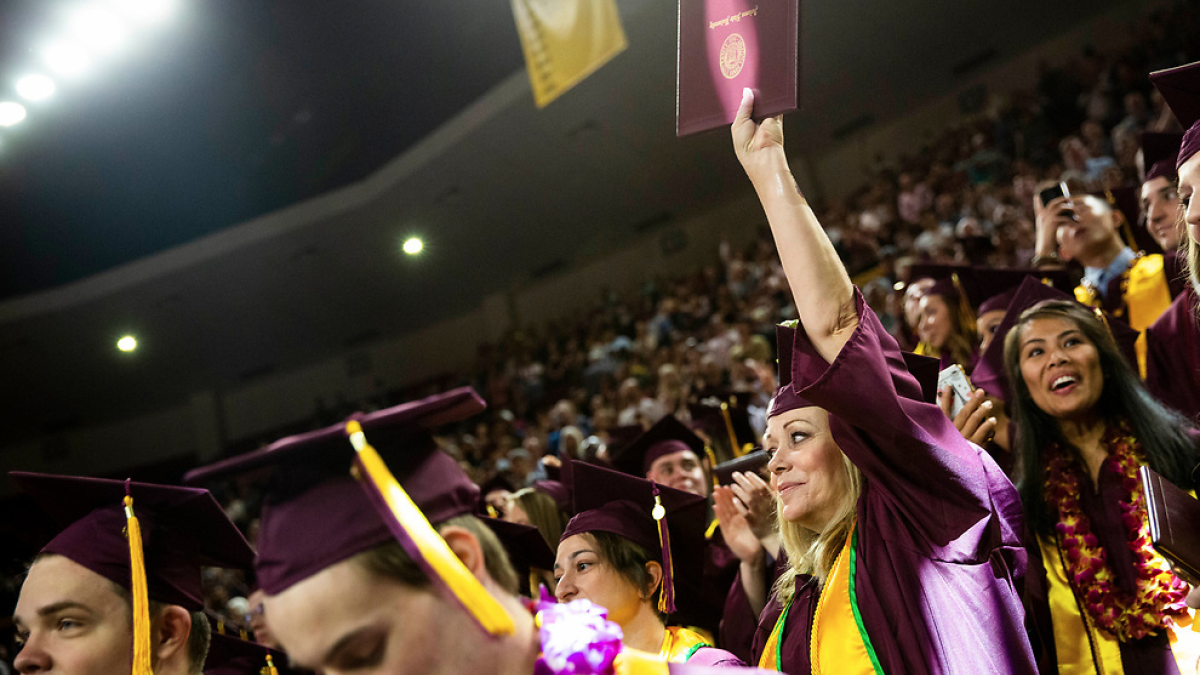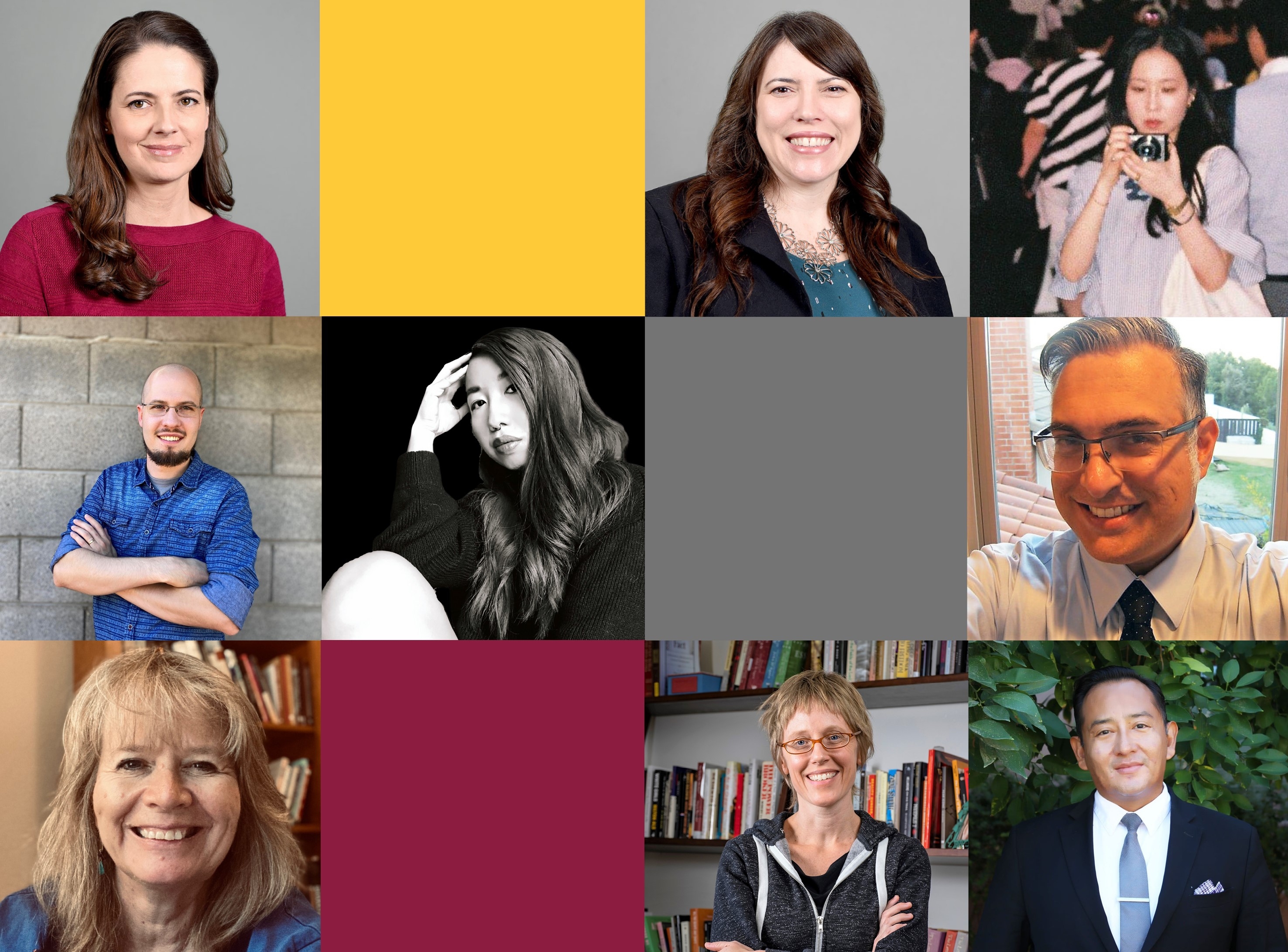In its 2022 “List of Public R1 Universities Graduating the Most English Majors,” education and career data service Steppingblocks puts Arizona State University at No. 4 in the Western U.S.
The news that the Department of English at ASU has among the nation’s largest number of graduates is hardly surprising; enrollment in this humanities unit of The College of Liberal Arts and Sciences at Tempe has continued to grow, even during the pandemic.
To borrow a misquoted phrase from Mark Twain, reports of the death of the English major “are greatly exaggerated” — at least at ASU. As of fall 2022, the department boasts 2,273 majors, a total that includes English as well as film and media studies majors, both on-campus and online.
Composed of six distinct areas of study — creative writing; film and media studies; linguistics and applied linguistics; literature; secondary English education; and writing, rhetorics and literacies — the Department of English also administers the university’s Writing Programs, which delivers writing instruction available to all ASU undergraduates. This fall alone, that equals nearly 12,000 students and over 500 sections of courses. Growth is projected into the spring semester.
To meet burgeoning university enrollment of both its own majors and the students it serves from across ASU, the department has again added another new crop of highly credentialed, award-winning faculty. Recent recruits include experts in rhetoric, in poetry and translation, and in creative nonfiction, among other specialties. Let’s meet Shersta Chabot, Denise Hill, Eunsong Kim, William Kruger, Muriel Leung, Vincent Oliveri, Laura Turchi, Sarah Viren and Kyle Wilson.
Top row, from left: Shersta Chabot, Denise Hill, Eunsong Kim. Middle row, from left: William Kruger, Muriel Leung, Vincent Oliveri. Bottom row, from left: Laura Turchi, Sarah Viren, Kyle Wilson.
Shersta Chabot, lecturer (Writing Programs)
Chabot’s appointment as a lecturer for ASU Writing Programs marks her 10th year teaching at ASU. This fall, she is instructing first-year composition courses informed by her work in cultural rhetorics. A passion for education and her early experiences with the injustices of intersectional discrimination are the twin guideposts of Chabot’s academic career. Her current research interests include cultural and digital rhetorics, gender studies and public memory.
Chabot earned both her Master of Arts and PhD in English (writing, rhetorics and literacies) at ASU. Her dissertation examined the cultural battle being fought over building a National Women’s History Museum in Washington, D.C. — it is currently a digital museum — and the current material reality of gender representation in the National Museum of American History.
Denise Hill, lecturer (Writing Programs)
Hill began her career in secondary education teaching high school English in the Phoenix area. She then moved to college-level instruction at the University of Nevada, Reno, and the University of Arizona before coming to ASU. She has taught courses in introductory and advanced composition, writing center pedagogy, literature and new media studies. Hill's scholarly interests include rhetorics of motherhood and inclusive pedagogy. She is committed to creating inclusive learning spaces for all students, especially those with neurodifferences. She volunteers her time with Spectrum Spaces, a group that helps community members and teachers create spaces that take into account the sensory needs of people on the autism spectrum.
Hill holds a PhD in rhetoric, composition and the teaching of English from the University of Arizona and a Master of Arts in literature (19th-century British and American) from the University of Nevada, Reno.
Eunsong Kim, associate professor (creative writing / Center for Imagination in the Borderlands)
Kim is an associate professor in the Department of English and associate director of the Center for Imagination in the Borderlands at ASU. Working in poetry, translation, visual culture and critical race studies, she is author of the poetry collection “Gospel of Regicide” (2017) and co-translator from Korean of Kim Eon Hee’s “Have You Been Feeling Blue These Days?” (2019). Her monograph, “The Politics of Collecting: Property and Race in Aesthetic Formation,” is forthcoming from Duke University Press. Her writings have appeared in: Lateral: Journal of the Cultural Studies Association, Journal of Critical Library and Information Studies and in the anthologies “Poetics of Social Engagement” and “Reading Modernism with Machines.”
She has received the Ford Foundation Fellowship, Yale's Poynter Fellowship and a grant from the Andy Warhol Art Writers Program. In 2021 she co-founded offshoot, an arts space for transnational activist conversations. Kim holds a PhD in literature and critical gender studies from the University of California, San Diego and an Master of Fine Arts in writing from the School of the Art Institute of Chicago.
William Kruger, lecturer (Writing Programs)
Kruger teaches a variety of courses in Writing Programs and in the Department of English, specializing in persuasive writing, rhetorical theory and research methods in first-year and advanced composition. He also occasionally teaches graduate courses for the master’s degree in linguistics and applied linguistics, focusing on introductory linguistics, the history of English and grammar instruction for Teaching English to Speakers of Other Languages.
As a researcher, Kruger studies linguistics and language variation, and he has published a number of articles analyzing varieties of English — both historical and modern-day — as well as on theoretical syntax and phonology, and on early English manuscript studies. Kruger holds a PhD in linguistics and applied linguistics and a Master of Arts in English, both from ASU.
Muriel Leung, visiting writer (creative writing / Center for Imagination in the Borderlands)
Leung is a visiting writer with the Center for Imagination in the Borderlands and the Department of English. She is author of the award-winning poetry collections “Imagine Us, The Swarm” (2021) and “Bone Confetti” (2016), as well as a collaborative poetry-photography book with visual artist Kristine Thompson, “Images Seen to Images Felt” (2018). Her writing appears in The Baffler, Cream City Review, Gulf Coast, The Collagist, Fairy Tale Review and elsewhere. She has received fellowships to Kundiman and VONA/Voices Workshop.
Leung earned a PhD in creative writing from the University of Southern California, where she was an Andrew W. Mellon Humanities in a Digital World fellow. She also holds a Master of Fine Arts in creative writing from Louisiana State University. She is the poetry co-editor of Apogee Journal and a publicist for Kaya Press.
Vincent Oliveri, lecturer (Writing Programs)
Oliveri is another newly minted lecturer in ASU Writing Programs. His research interests include persuasion, motivated reason, deliberative democracy, political judgment formation and validity in qualitative research. He particularly enjoys teaching discipline-specific writing — primarily in biology — where students learn writing from a specific audience or usage perspective. This approach, known as “writing in the disciplines,” is a sibling to another strategy that Oliveri teaches: “writing across the curriculum,” which gives students opportunity to write in many contexts and for many purposes (not just in their composition classes).
Oliveri earned a PhD in English language and literature (emphasis in rhetoric and composition) from the University of Washington and a Master of Arts in English literature from Claremont Graduate University.
Laura Turchi, clinical professor (Arizona Center for Medieval and Renaissance Studies)
Turchi rejoined ASU last academic year: She was on the faculty in the English education program and director of the Teaching Foundations Project before moving to Houston. Turchi is now working primarily for the Arizona Center for Medieval and Renaissance Studies as the curriculum director for the center’s multimillion-dollar Mellon Foundation project, RaceB4Race: Sustaining, Building, Innovating. The initiative creates resources in premodern literature, history and culture, offering innovative curricula, course materials and pedagogical approaches. Turchi is also teaching the discovery seminar LIA 194: Why I Hate Shakespeare, exploring the Bard’s ubiquitous presence on social media. A specialist in curriculum theory and methods for English language arts teaching, Turchi previously collaborated with Regents Professor Ayanna Thompson on "Teaching Shakespeare with Purpose: A Student-Centered Approach” (2016) and is most recently a co-editor of the volume “Cross-Disciplinary, Cross-Institutional Collaboration in Teacher Education” (2021).
Her book "Teaching Shakespeare with Interactive Digital Editions" is forthcoming in the Cambridge University Press’s Elements series. A Fulbright Scholar and education specialist, Turchi holds an EdD from Appalachian State University and an MEd from National Louis University.
Sarah Viren, assistant professor (creative writing)
Viren is an assistant professor in the Department of English, formerly with ASU's College of Integrative Sciences and Arts. She is author of the award-winning essay collection “Mine” (2018) and translator from Spanish of the novella “Córdoba Skies” (2016) by Argentine author Federico Falco. She was a finalist for the National Magazine Award for her essay "The Accusation," published in The New York Times Magazine in 2020. Her memoir, “To Name the Bigger Lie,” is forthcoming from Scribner, and her co-edited essay anthology “The Great American Essay” is forthcoming from Mad Creek Books. This fall, Viren is teaching ENG 288, a beginning fiction workshop for ASU Online students, and a special topics course ENG 394: “The Art of True Crime” on the Tempe campus.
Viren’s work has been supported by a National Endowment for the Arts fellowship, a Kerouac House residency and a Fulbright Student Grant to Colombia. She earned a PhD in English literature and comparative literature from Texas Tech University and a Master of Fine Arts in nonfiction writing from the University of Iowa.
Kyle Grant Wilson, lecturer (Writing Programs)
Wilson is Diné (Navajo) from Fort Defiance, Arizona. This is his 23rd year teaching at the university, most recently as an instructional professional in English. Wilson’s appointment as a lecturer will enable him to focus more fully on his role as Indigenous rhetoric coordinator for Writing Programs, a role he relishes. Indigenous rhetoric sections of first-year composition (ENG 101/102) are a fusion of American Indian studies and writing instruction, traversing topics such as Indigenous decolonization, self-identification, acculturation and voices from the periphery for empowerment. Wilson founded and directs Project Communal Effort at ASU, a student-run group that organizes fundraisers to benefit local Indigenous families facing disparities.
Wilson publishes on the themes of Indigenous identities and decolonization, and his poems have been published in Rattle, Arizona Highways, The Arizona Republic, Red Ink and more. He serves on The College of Liberal Arts and Sciences Dean’s Advisory Council on equity, diversity and inclusion and is honors faculty in Barrett, The Honors College at ASU. He is a poet and earned his Master of Fine Arts in creative writing at ASU.
Top photo: Students at The College of Liberal Arts and Sciences maroon convocation in 2019. Photo by Deanna Dent/ASU
More Arts, humanities and education

Honoring a legacy of cultural education, exploration
Belle Edson has inspired countless students to expand their horizons during her 26-year tenure at Arizona State University. A beloved professor and director of undergraduate studies and core courses…

School of Social Work’s ‘keepin’ it REAL’ substance use prevention program to expand across Sonora this spring
More than 7,000 seventh graders in the Mexican state of Sonora will enroll this spring in an Arizona State University program that has been teaching how to prevent substance use to thousands of…

An intergenerational approach to learning
Five students stood in front of the class and went through their presentation, complete with video and, afterward, a Q&A session.At first glance, it was similar to the hundreds of presentations…

